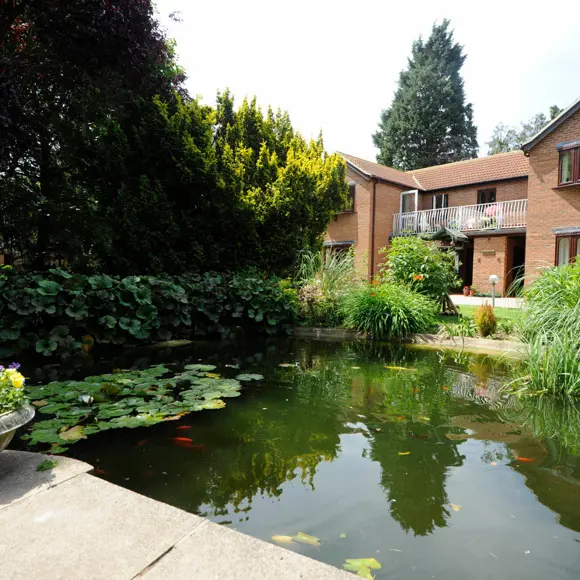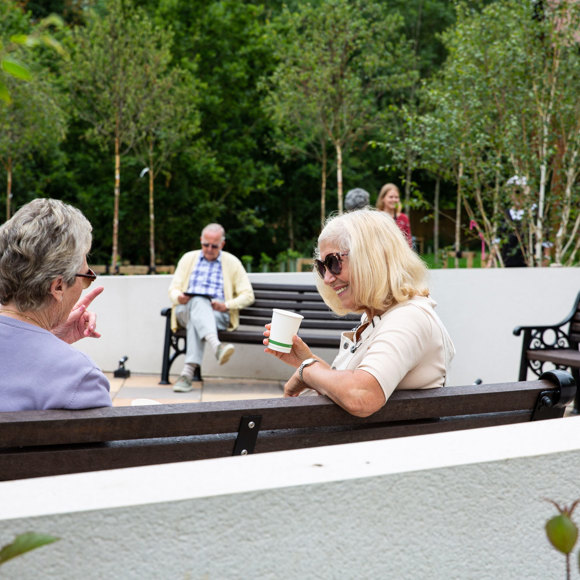Selling your home in retirement: a complete guide
Retirement marks an exciting new chapter, and one that opens so many doors, whether that’s more free time for your loved ones, hobbies and passions, jet-setting on the adventure of a lifetime or relocating to a new community.
You might be considering selling your home, and there are plenty of reasons why people choose to do this in retirement. However, we appreciate there’s a lot to consider, and questions you need answering.
Should I sell my house when I retire?
While you may not be sure whether or not you want to sell your house when you retire, here are some things to think about to help you decide if it’s right for you:
1. Financial stability
If selling your house could provide a financial cushion or fund your retirement lifestyle, it might be a wise choice.
A property valuation, while considering your remaining mortgage balance, will give you a sense of how much equity you could release from a property sale to help you decide if it’s worth it.
It’s also important to bear in mind how the housing market is performing at the time you want to sell.
2. Housing maintenance
Compare the costs of maintaining your current home with the costs of living in a different home or a retirement community. Remember to consider property taxes such as stamp duty, utilities, maintenance, and any fees.
It’s also worth considering the cost of your time and effort with your current property - is the upkeep something you want to commit to in later life? That’s another reason many people decide to sell and move into retirement communities like ours - cleaning, laundry and property maintenance are all included in our service. These added benefits differ by community, but are offered to an extent to help take the burden these tasks require.

3. Downsizing
Downsizing - or, as we prefer, ‘rightsizing’ - can be a great reason to sell your home in retirement. It gives you the chance to find a home that’s the right size for your needs now and in the future.
4. Location and lifestyle
Consider whether where you’re currently living suits the lifestyle you want in retirement. You might want to be closer to family, spend some time living in or in close proximity of a city or the countryside, or move closer to a larger airport if travel is on your retirement agenda.
5. Health and mobility
While it isn’t always easy, thinking about the long term is important when it comes to considering a retirement move. A lot of retirees choose to move into one level apartments, cottages or bungalows so that they no longer have stairs.
It could also be worth considering whether you want to be closer to care over the coming decades. Our retirement communities offer additional care and wellness services to support your long-term wellbeing and keep you living independently.
6. Estate planning
Think about how your home fits into your estate plans as it could be a valuable asset to leave to your loved ones. Before making your final decision, think about discussing your choice with a financial advisor - they can provide personalised advice based on your financial situation and retirement goals.
Before making your final decision, think about discussing your choice with a financial advisor - they can provide personalised advice based on your financial situation and retirement goals. We also advise you speak to loved ones, such as family and relatives, as it's important that everyone understands the financial contract and is supportive of the move
How to sell your property in retirement, step by step
It may have been a while since you last sold a property, especially if you’ve been in your family home for many years. Here’s a quick and simple refresher on how to sell your home once you’ve retired…
1. Get your property valued
Get your property valued by a professional to determine its market price. You can get multiple valuations to get an average estimate.
Our local sales team are here to help you and can assist with putting you in touch with local trusted agents.
Contact us

2. Choose an estate agent or sell privately
Decide whether to sell through an estate agent or privately. An estate agent can handle viewings and negotiations but will charge a fee. Selling privately can save you money but requires more effort.
If you’d rather take the stress off your plate altogether, here at Retirement Villages Group we can help!
Our Managed Sale Services are for those who still want to sell via an estate agent, without the stress of managing the actual sale. Arranging an estate agent will be taken care of, and they will manage the entire sale, from property valuation to preparing the sale listing, to negotiating offers.
Our Home Buying Services takes this one step further - we’ll arrange for offers to be made on your property for a guaranteed purchase, meaning you never have to list your property! You’re under no obligation to say yes, but if you do, the entire process is taken care of.
3. Find a solicitor or conveyancer
Before listing your property or soon after, find a solicitor or conveyancer to handle the legal aspects of the sale like contracts and dealing with the Land Registry.
The main difference between a solicitor and a conveyancer is that the former offers a range of legal services including conveyancing, whereas the latter is specifically trained to deal with property transactions. A licensed conveyancer is usually more cost-effective than a solicitor.
Here are some tips for finding the right solicitor or conveyancer for you:
- Get recommendations: Ask friends, family or colleagues who have recently sold a property for recommendations. You can ask your estate agent, but remember they may receive a commission for referrals, and you can also reach out to us directly if you are interested in one of our properties
- Check credentials and reviews: Ensure that they’re licensed and regulated, and read through their reviews to make sure their previous clients have been happy.
- Compare quotes: Get quotes from multiple conveyancers or solicitors and make sure they break down all the costs, including disbursements, so there are no surprises later. Be wary of unusually low quotes as they may not include all necessary fees.
- Ask questions: Before deciding, ask potential conveyancers about their process, timeline, and how they'll keep you informed.
- Location: While not as crucial as it once was, having a conveyancer local to the property can be helpful, especially if they have local knowledge or if you prefer face-to-face meetings.
4. Start searching for your new home
Start looking for a new home to buy, or maybe you’re interested in renting in retirement. To find out more about moving into one of our retirement communities, take a look at how moving in works before browsing our stunning retirement properties for sale and to rent across the UK.
5. Prepare your home for sale
Declutter, clean and take care of any repairs you need to prepare your property for sale. You might want to stage the property to make it more attractive to potential buyers.
6. Find your Energy Performance Certificate (EPC)
You need to have an EPC for potential buyers - it provides information about the property's energy use and typical energy costs. If you haven’t seen your EPC for a while, don’t worry. The Gov website has a handy service for finding an EPC, as well as getting a new one issued if yours has expired or your property doesn’t have one.
7. Set an asking price
Based on the valuation, set a realistic asking price. Your estate agent can guide you on this.
8. List your home
It’s time to market your home to prospective buyers! If you’re using an estate agent, they will market your property, listing it on property websites like Rightmove, their own website, and possibly local newspapers. If you choose to sell privately, you will need to arrange the marketing yourself.
9. Hold viewings
Allow potential buyers to view the property. Your estate agent can handle this if you prefer.
10. Receive and negotiate offers
Once you start to receive offers you can begin negotiating. Your estate agent can help with this process or you can ask them to handle it entirely.

11. Accept an offer
Once you're happy with an offer, you can formally accept it.
12. Exchange contracts
Your solicitor/conveyancer will handle the legal paperwork, then, once everything is ready, contracts will be exchanged. Only at this point does the deal become legally binding.
13. Complete the sale
Your solicitor/conveyancer will agree on a completion date with your buyer’s solicitor/conveyancer. On the completion date, your property legally changes hands. You receive the payment, and the buyer gets the keys.
14. Settle any costs
If you have a mortgage, it needs to be paid off with the sale proceeds. You’ll also need to settle any outstanding fees with your estate agent and solicitor.
Download & print your free checklistWhy retirement communities are so popular
It’s natural to have concerns about selling your home during retirement and your next move. That’s why retirement communities have become so popular over the last few decades - they often offer a solution to some of the common worries:

Welcoming family and friends
If you’re thinking about downsizing, you might be concerned that there won’t be anywhere for family to stay when they visit. At our retirement communities, your families are welcome whenever they like, and together you can enjoy our fantastic facilities like our restaurants, bistros and bars. Plus, we have onsite guest suites so your family can stay the night.
A sense of community
Moving somewhere new may feel intimidating. That’s another reason why many people opt for retirement communities as, with a buzzing social calendar and lovely communal spaces, there’s always someone to have a coffee with, chat to and spend time with. It makes integrating into a new area easy.
Alan and Carol Murray, Lime Tree Village:
We know more people around us now than we did in the last ten years in our previous home!
Means-tested pensions and benefits
Selling your house won't affect your State Pension as it is based on your National Insurance record and not on your income or capital. However, selling can still have financial implications, for example, if you receive means-tested benefits like Pension Credit, Housing Benefit, or Council Tax Reduction, any money you make from selling your home could affect these.
After selling your home, if the proceeds increase your savings above a certain threshold (~£16,000), it could reduce or stop your entitlement to these benefits. However, if you use the sale proceeds to buy another property, this money won't count as capital.
It's important to get independent financial advice before selling your house, especially if you're concerned about how it might impact your pension and benefits.
What will the tax implications be as a retiree?
There are certain tax implications you’ll want to consider before deciding to sell your home in retirement:
- Capital Gains Tax (CGT): You’ll only pay CGT if the property you sell isn’t your main residence, like a second home or investment property. In this case, you may have to pay CGT on any profit made above the tax-free allowance. This allowance changes from year to year, but the Gov website is always an up-to-date source.
- Inheritance Tax: If you sell your home and gift the money to someone and then live for another seven years, the gift is usually outside of your estate for Inheritance Tax. There is, therefore, considerations with this, so it would be beneficial to double-check with a financial advisor.
- Income Tax: Selling your home doesn’t typically incur Income Tax. If you decide to rent out your former home, any income received from renting will be subject to Income Tax. Remember, everyone’s situation is unique and tax laws can be complex. You may want to consult a financial advisor or tax specialist to understand the specific implications for your individual circumstances.
What about renting?
Renting offers flexibility, reduced property maintenance worries, and access to more capital from selling your home. However, if you don’t buy a property, you won’t have an opportunity for equity release in the future if you want. You also need to be confident that you can manage the ongoing rental costs throughout your entire retirement. And if you weren’t sure, you can rent a retirement property in our communities too.
Selling your home in retirement has never been easier
With our partners at Spring, selling your home is simple, stress-free and smooth. They can take your property off your hands fast so you can join your retirement community sooner and start living the retirement lifestyle you’ve dreamed of.
And if you’d like even more support with the move, The Senior Move Partnership are on hand to help you with everything from decluttering and packing, to moving and unpacking in your new home.
Interested in what retirement in one of our communities could look like? Take the step towards your next adventure and take a look at our retirement properties for sale.
Take a look at our retirement properties for sale
